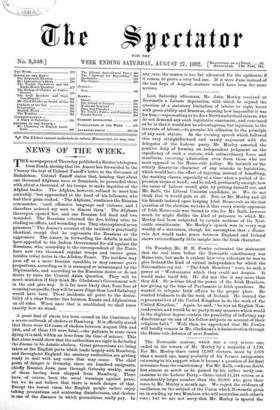Last Saturday afternoon, Mr. John Morley received at Newcastle a
Labour deputation, with which he argued the question of a statutory limitation of labour to eight hours with great ability and firmness, showing how impossible it was for him,—representing as he does Northumberland miners, who do not demand any such legislative enactment, and convinced as he is that it would not be advantageous, but injurious, to the interests of labour,—to promise his adhesion to the principle of any such statute. In the evening speech which followed this very straightforward and manly argument with the delegates of the Labour party, Mr. Morley asserted the positive duty of forming an independent judgment on the expediency of such a statute, with extraordinary force and manliness, extorting admiration even from those who are most opposed to his Home-rule policy. He insisted on the utterly disastrous character of any mistake in legislation, which would have the effect of injuring, instead of benefiting, the working classes, especially at a time when a period of de- pression seems at hand; and he asked, pertinently enough, how the cause of Labour would gain by putting himself out, and Mr. Ralli, the Liberal Unionist candidate, in. We do not thin ic that it would gain, at all. But, as Mr. Morley and all his friends insisted upon keeping Irish Home-rule as the test question of the election, we take it that every sturdy opponent of Irish Home-rule was bound to vote for Mr. Rail, however much he might dislike the kind of pressure to which Mr. Morley had been subjected by certain sections of his New- castle constituents. Mr. Morley's speech was in every way worthy of a statesman, though his assumption that a Home- rule Act would make peace between England and Ireland shows extraordinarily little insight into the Irish character.


































